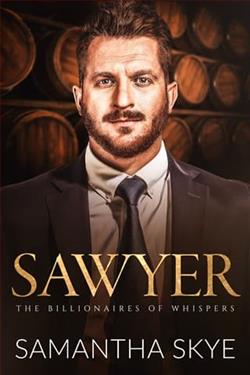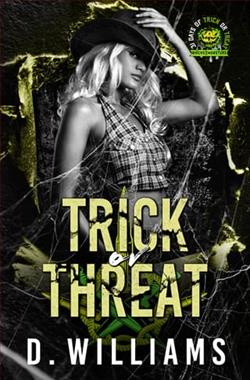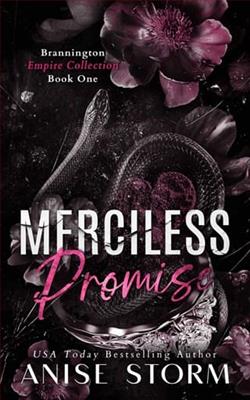Page 48 of Paranoia
I looked over at Walter Jackson. “You were the first one to bring up the link between former arrests by the Land Sharks and drug dealers being murdered. We combine that with the retired cops, it’s a pretty serious body count. The situation seems to be spiraling into something big. Really big. And a little unsettling. And the one thing they all had in common was some connection to Richard Deason. The closest connection we have to him is his son, Antonio. We don’t have any idea what their relationship was like. We also have almost no idea what Antonio has been up to, beyond the makings of a drug deal with your gang in the Bronx.”
Terri looked at Trilling. “We know what Antonio’s been up to. Following in his father’s footsteps.”
I said, “Walter found some family connections from the mother’s side. One of the uncles looks like he’s a mercenary type. Maybe he’s doing the killings on behalf of his nephew. Or, more likely, hired someone to do them.”
Walter Jackson said, “That’s a lot of territory to cover. Where do we start?”
We hadn’t heard anything from Rob Trilling yet. I turned to him and said, “What do you think?”
As always, he took a moment to answer. He wasn’t being sly or coy. He was being thoughtful. “Looks like the most obvious course would be for us to go back to SoHo, keep trying to follow Antonio Deason and see exactly what he gets up to during the day.”
I looked at Terri and Walter and said, “He’s really starting to get the hang of this whole investigation thing.”
Walter said, “He’s learning so fast, he’s in a class by himself.”
Everyone groaned at that pun. It was the first time I’d ever seen Walter look defensive. He raised his hands and said, “C’mon, I came up with that one on the fly. I deserve a little credit.”
The three of us were already thinking of our surveillance plan.
CHAPTER 69
HOMICIDE DETECTIVES DON’T typically conduct surveillances of suspected drug dealers. Following those suspects is work more often done by the narcotics squad. I did a couple of surveillances when I was on a robbery unit years ago. We developed a suspect for a series of robberies, then tried to follow him. I wouldn’t say it was a waste of time, but it did not resolve the case. Only once did we actually observe a suspect as he attempted to commit a robbery. And even in that case, we were working on a tip from an informant.
One time Ididfollow a homicide suspect all the way from Manhattan to Buffalo. Most of it was on the highway, and it was pretty easy for two cars to keep up with the suspect. The New York State Police helped quite a bit. An inspector with the State Police named Bud Wilson arranged for us to be relieved at night and get a few hours’ sleep.
The next day, we followed the suspect all the way back to Manhattan. We never saw him meet with anyone or do anything suspicious. He stayed at a cheap hotel. We couldn’t tell if any of the people who came and went were there to visit him. The craziest part was that as soon as he got out of his car back in Manhattan, his estranged wife walked out of the building and shot him in the head.
At least we made one arrest for homicide. Turns out he had been visiting a girlfriend in Buffalo at the low-rent hotel, but no one had noticed the woman going to his room. I hoped today’s surveillance would go better.
It was a nice change of pace. The skies were clear and there were no visibility issues. It got me out of the office and made me think, at least for a while, that I was in control of the investigation. But surveillance still isn’t my thing. Hernandez sat at one end of Antonio Deason’s block in her SUV. Trilling and I were in my Impala at the opposite end of the block.
We caught a break a few minutes after we’d set up our surveillance of Antonio’s apartment in SoHo. The electric Porsche that I’d heard so much about came down the street and stopped directly in front of his building. I expected Deason to hop out of the car so was surprised when instead a dark-haired woman in her thirties stepped out. Deason came from the building immediately, spoke to the woman, then got into the Porsche by himself and pulled away from the curb.
It was at that moment I realized we should’ve had more officers working this surveillance. If we’d had more people, someone could’ve stayed to see where the woman who got out of the Porsche Taycan went. Was she his assistant? His girlfriend? Did she work at a mechanic’s shop and was returning the vehicle? Allquestions I knew would have to be answered as we watched Antonio Deason drive away.
Terri Hernandez fell in behind us. If we didn’t switch up leads, anyone we were surveilling might notice the same car tailing them after a while. Cops have been doing it the same way for decades.
Not long into our following Antonio Deason, less than five minutes, a blue Chevy Tahoe came off a side street as we were pulling up to a stoplight and stopped between us and the Porsche. When the light turned green, the Tahoe didn’t move.
I honked, but in Manhattan that’s about as effective as blaming other people for your problems. I stuck my head out of the Impala’s driver-side window hoping to spot which direction Deason had taken. All I saw was his left hand extended out of the window, shooting us the bird.
The Tahoe finally started to move slowly through the intersection, but there was no way I could get around it. Hernandez had raced ahead on a parallel street. After a few minutes we realized we’d lost our target.
Trilling turned to me and said, “What do we do now?”
“That is a really good question.”
CHAPTER 70
KEVIN DOYLE SAT in the comfortable Kia he’d rented under the name Dave Allmand. He rarely rented. It was tough to explain to Avis how a bumper got damaged. He preferred to use a stolen car when committing a crime. He had a discreet little electronic device that got him into almost any somewhat newer model, and he went old-school with older models. But some days, like today, he just needed a nondescript vehicle he could use to check out a number of places around the five boroughs.
He was parked in a loading zone. The sign didn’t matter because he didn’t intend to leave the car. Doyle just sat there, staring at the message on his burner phone. His employer wanted him to keep an eye on an NYPD detective named Bennett. They told him to make a contingency plan in case the detective got too close. There were two attachments to the text, intel sheets just like the ones that had been provided for his other assignmentshere in New York. One was on Bennett, and the other was on another NYPD detective named Robert Trilling, an Army vet.Shit.This assignment kept getting worse. Just when he thought he’d almost finished, they threw this at him.
Doyle looked up from his phone. There were very few people on the street, for some reason. Usually this part of Brooklyn had more foot traffic. It did give him a clear line of sight to the building he’d been watching for the last hour: the diner where Tammy worked. He was stuck on her. There was no way around it.
This particular position gave him a view of both the front and the rear of the diner. The wide windows on the side of the building let him look all the way inside. There were two people at the counter and two occupied booths. He had caught a couple of glimpses of Tammy running food out to the booths or chatting with the men sitting at the counter.
Then he saw the back door open. An older man shuffled out and tossed something into the dumpster at the rear of the building. He was big. Maybe six foot four and a little overweight. This had to be Tammy’s tyrannical uncle. He wore a white T-shirt and blue work pants with an apron. It had to be him.















